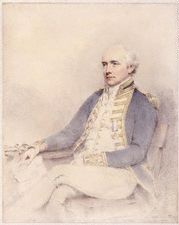The directory «Plots of stamps in the catalogue»
Gambier James
(1756–1833)

1st Baron Gambier, English admiral, was born in the Bahamas, while his father John Gambier was Lieutenant Governor of the Bahamas. He entered the navy list in 1767 as a midshipman on board the Yarmouth, commanded by his uncle, and family interests gained him rapid promotion. By the age of 22, Gambier was promoted to Post-Captain and appointed to the 32-gun frigate Raleigh, in 1778. In 1783 when peace broke out, he was placed on half-pay, but when the Frence Revolution broke out in 1789 he was appointed to command the 74-gun Defence under Lord Howe, and by 1795 was a rear-admiral. In 1794, Captain Gambier received the gold medal and was appointed Colonel of the Marines; 1795, promoted to rear-admiral; 1795, appointed as one of the Lords of the Admiralty; 1799, vice-admiral; 1801, commander of the 98-gun Neptune and third-in-command of the Channel Fleet under Admiral Cornwallis; 1802, governor of Newfoundland and Commander In Chief of all ships appointed there. 1804, back to the Lords of the Admiralty, 1805 promoted to Admiral, 1807 still a Lord of the Admiralty but also saw action in the Battle of Copenhagen, where with Lore Cathcart, captured the Danish navy, including stores on land, for which he received official thanks from Parliament and a Peerage. In 1809, he threw away destruction of the French Fleet in the Battle of the Basque Roads in one of the Royal Navy's biggest embarrassments--but also one of its most cherished victories. In 1813 he was part of the team negotiating The Treaty of Ghent between the UK and US. Became Lord Gambier of Iver 9 November 1807.
In 1808 Gambier gave up his Admiralty seat to take command of the Channel Fleet, and as commander of that fleet, he prevented one of England's most prominent and capable sea commander from utterly destroying the French Fleet in the Napoleonic Wars. Gambier is best-known for his role in preventing Lord Cochrane in the Battle of the Basque Roads from completely smashing the French Fleet to splinters. Gambier refused to commit the Channel Fleet to shelling the French after Cochrane had driven the entire fleet - excepting two ships - aground at Rochefort.
Both Lords Gambier and Cochrane were members of Parliament, and Cochrane bitterly attacked Gambier's acts in not finishing off the French Fleet after Cochrane drove them ashore. Cochrane's accusations were severe enough that Gambier demanded - and got - a court-martial for himself, to clear his name. Gambier's "old-boy" stature was enough that he was acquitted.
Modern scholars typically now acknowledge that Gambier prevented Cochrane from achieving a critically important naval victory, and also point out that while Gambier possessed principle and courage, his administration of the Admiralty was also one of the most scandal-ridden known.
Belgium, 1964, Admiral Gambier and J. Q. Adams after signing treaty